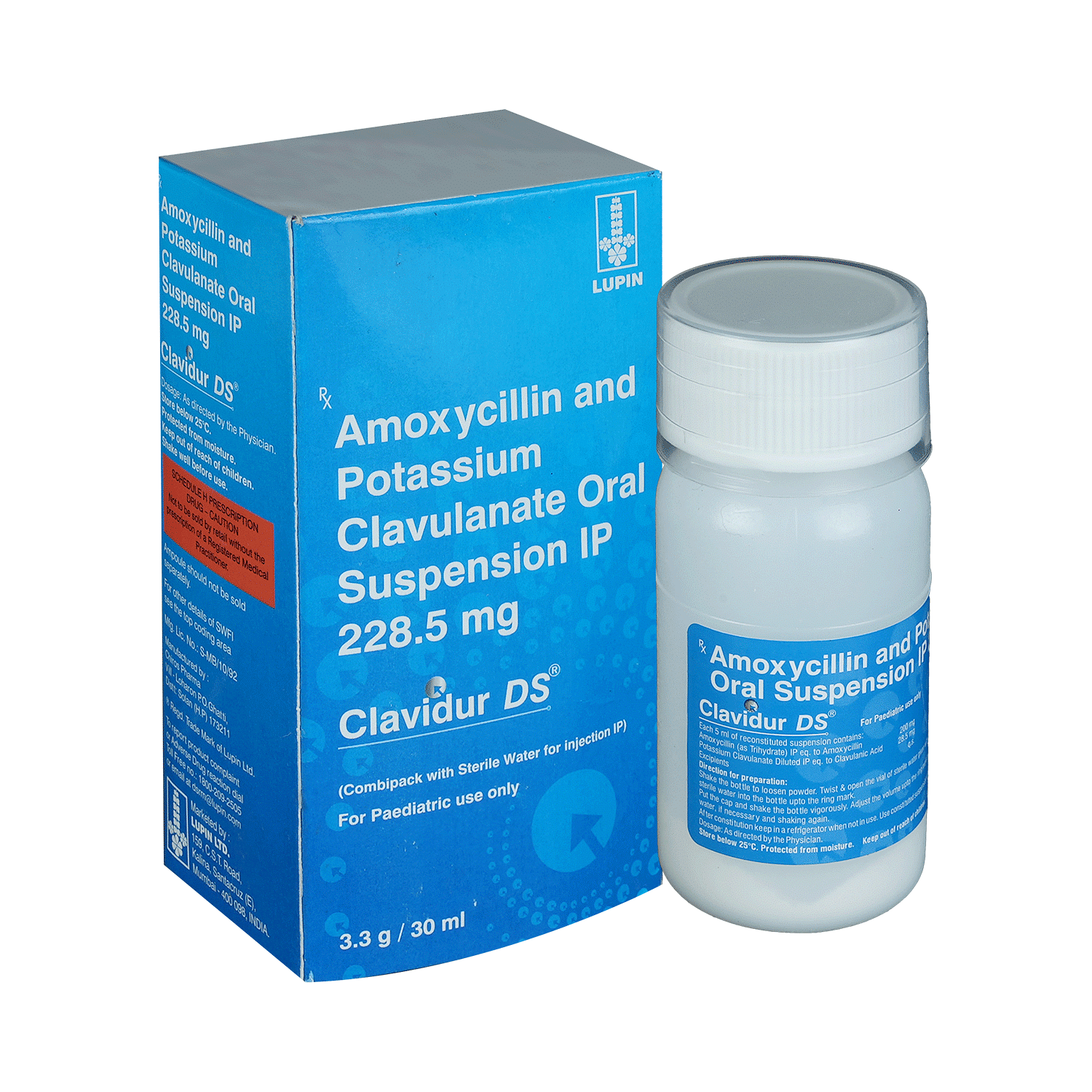
Fitclav Syrup
Manufacturer
Medrix Pharma Pvt Ltd
Salt Composition
Amoxycillin (200mg) + Clavulanic Acid (28.5mg)
Key Information
Short Description
Fitclav Syrup is an antibiotic medicine that helps treat bacterial infections of the ear, nose, throat, chest, lungs, teeth, skin, and urinary tract.
Dosage Form
Syrup
Introduction
Fitclav Syrup is an antibiotic medicine that helps treat bacterial infections of the ear, nose, throat, chest, lungs, teeth, skin, and urinary tract. It is capable of killing bacteria that have become resistant to other therapies and thus also helps treat tuberculosis that is resistant to other treatments.
Directions for Use
Your child must complete the entire course of antibiotics. Stopping too soon may cause the bacteria to multiply again or cause another infection.
Safety Information
Side Effects
Bitter taste in the mouth after intake Diarrhea Itchy rash, facial swelling, or breathing difficulty (stop use and report to doctor immediately)
How it works
Fitclav Syrup is an antibiotic. It has two active agents amoxycillin and clavulanic acid. Amoxycillin works by preventing the formation of the bacterial protective covering (cell wall) essential for the survival of the bacteria. Whereas clavulanic acid serves a special purpose of inhibiting an enzyme (beta-lactamase) that is produced by resistant bacteria.
Quick Tips
Your child must complete the entire course of antibiotics Encourage your child to drink plenty of water in case diarrhea develops as a side effect Never give Fitclav Syrup until and unless prescribed by the doctor Do not give Fitclav Syrup to treat common cold and flu-like symptoms caused by viruses Check 'expiry' before giving Fitclav Syrup to your child and immediately discard all the expired medicines
Related Medicines

Amc Syrup

Knollclav CV Syrup

Clavflow Syrup

Moxidian CV Syrup

Rosclav Syrup

CV M Syrup

Nvmox Syrup

Byclav CV Syrup

Amoxirut CV Syrup

Clavidur DS Syrup
Frequently asked questions
Can other medicines be given at the same time as Fitclav Syrup?
Fitclav Syrup may interact with other medicines or substances. It is important to inform your child's healthcare provider about all medications your child is taking before starting Fitclav Syrup. Consulting a doctor is recommended for ensuring appropriate medication administration.
Can I get my child vaccinated while on treatment with Fitclav Syrup?
Antibiotics usually do not interfere with vaccine ingredients or trigger adverse reactions in children who have recently received one. However, it's crucial to consult a doctor before administering any medication to your child during illness. Once the child recovers from the illness, then vaccination can be administered.
Which lab tests may my child undergo while taking Fitclav Syrup on a long-term basis?
Periodic kidney and liver function tests may be ordered for long-term therapy to monitor your child's condition.
Can I give a higher than the recommended dose of Fitclav Syrup to my child?
No, exceeding the recommended dosage of this medication can increase the risk of adverse effects. If your child experiences increased symptom severity, contact their doctor for reevaluation.
Can I stop giving Fitclav Syrup to my child when the symptoms are relieved?
Do not discontinue Fitclav Syrup without consulting a doctor before completing the full course. Symptoms may improve before complete cure, so continued treatment is necessary.
Can the use of Fitclav Syrup cause diarrhea?
Yes, Fitclav Syrup can lead to diarrhea. This medication contains antibiotics that kill harmful bacteria and may affect the beneficial bacteria in your child's stomach leading to diarrhea. In such cases, encourage drinking fluids like water to minimize dehydration risk. Consult a doctor for any persistent diarrhea or signs of dehydration (reduced urination, dark-colored urine with strong odor). Avoid giving your child any other medication without consulting a doctor.
Do all viral common colds result in secondary bacterial infection?
Most times, bacterial infections do not follow viral infections. In fact, using antibiotics in viral infections may increase the risk of side effects. Always seek medical advice from your child's doctor before administering antibiotics.
The mucus coming out of my child’s nose is yellow-green. Is it a sign of a bacterial infection?
Yellow or green mucus in the nose does not automatically indicate a bacterial infection. It's normal for mucus to thicken during a common cold and change color, typically lasting 7-10 days.
Is there any sign which shows that my child needs immediate medical attention?
Call your child's doctor immediately if they experience severe allergic reactions (breathing problems or skin rashes), gastrointestinal distress (diarrhea), and liver damage (weakness, paleness, vomiting). These are rare side effects but require expert attention.


